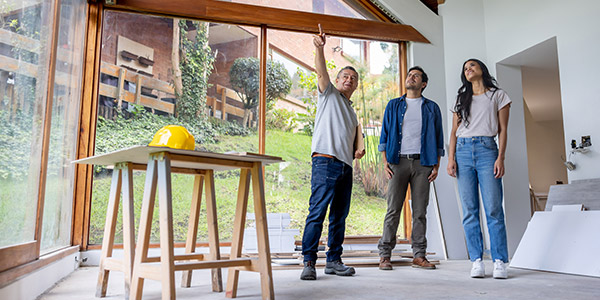Homeowners
6 Tips for Choosing a Contractor
September 4, 2018
Whether it's a single project or a full renovation, the most critical element to success is the person you hire to get the work done. Contractors can be amazing assets. They can make suggestions that a designer may never think to consider. They can keep you on budget and even find ways to save you money. This makes choosing the right contractor so important.
Hiring the right contractor is about more than getting the lowest bid. It's about finding a professional you are confident will understand what you want, provide the finished quality you envision, and do so for a fair price.
To help you recognize that special mix of professionalism, competence, integrity, and communication skills, here are six tips to keep in mind as you interview candidates.
1. Their name keeps coming up
They've done work for neighbors, friends, and/or family members that has impressed you. After you find someone with a good reputation, it's important to talk to several candidates to make sure the pricing of your project and the approach the contractor you favor wants to take are reasonable.
2. Interest in your project is evident
As you describe what you need, the contractor is already thinking about how to do the project better and with greater cost efficiency. By speaking with several contractors and asking them the same questions, you can often learn about additional considerations that impact how best to approach the job. You can also judge who has the best skill set and the most interest in doing the project.
3. Reputation and integrity matter to them
When you think you have the right person, check for online reviews and, for larger projects, Better Business Bureau (BBB) reports. Even good contractors may earn some negative feedback, but what you want to see is how they resolve any complaints.
4. They are quick to provide credentials
A good contractor will not balk when you ask for proof of insurance, licenses, and client references. Still, as much as you want to trust them, verify the information and call the references.
5. They put things in writing
Once you get a contract, look at it to make sure the job is properly described. When a contractor takes the time to create a document with precise line items and details about the job's phases, they tend to have a good idea of what you are asking for and what they need to do to get it done. Then, make sure the numbers make sense.
6. Payment is matched to milestones
While it's reasonable to request a deposit to secure time on a busy schedule and allow materials to be purchased, the deposit typically should not exceed 10–25 percent. Payments should then be structured that coincide with specific milestones being met. The final payment should not be expected until after you approve of the work done and determine the project is complete.
Discuss permits from the beginning and make sure you are receiving copies of every bit of work that requires them and your contractor stands by the work. If you do not have your improvements properly permitted – or you don't know where the permits are – it can affect the resale value of your home or even delay or cancel a sale.
Entering a successful relationship with a contractor is like any other relationship – it may take some time before it clicks. That's why open communication and mutual respect for expertise, on your part, and your home and family's comfort, on the contractor's part, go a long way toward producing a good experience.





 Smart Moves Start Here.
Smart Moves Start Here.